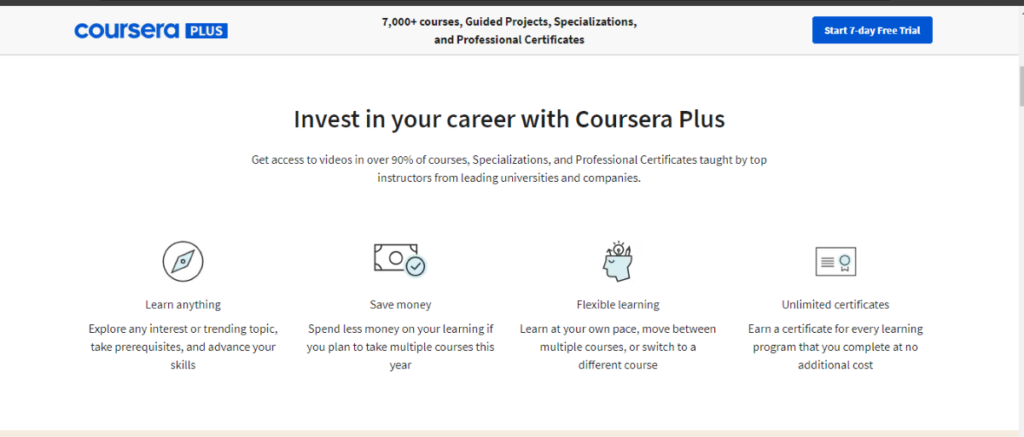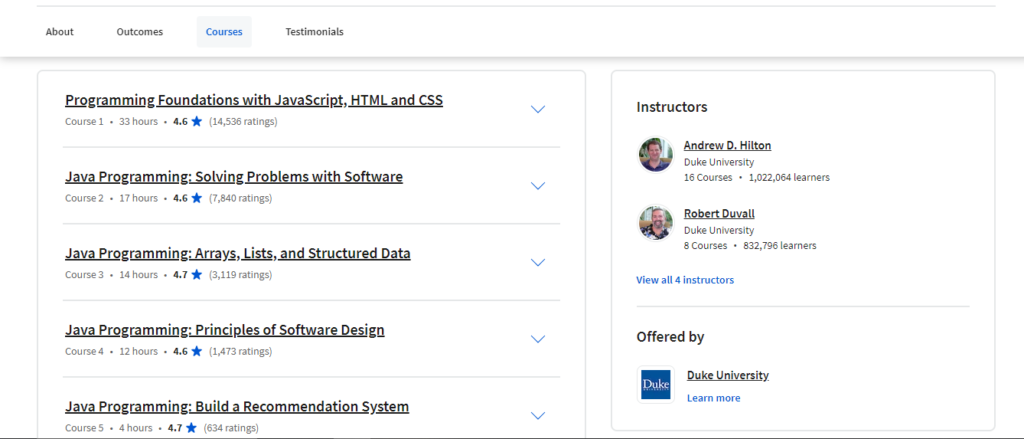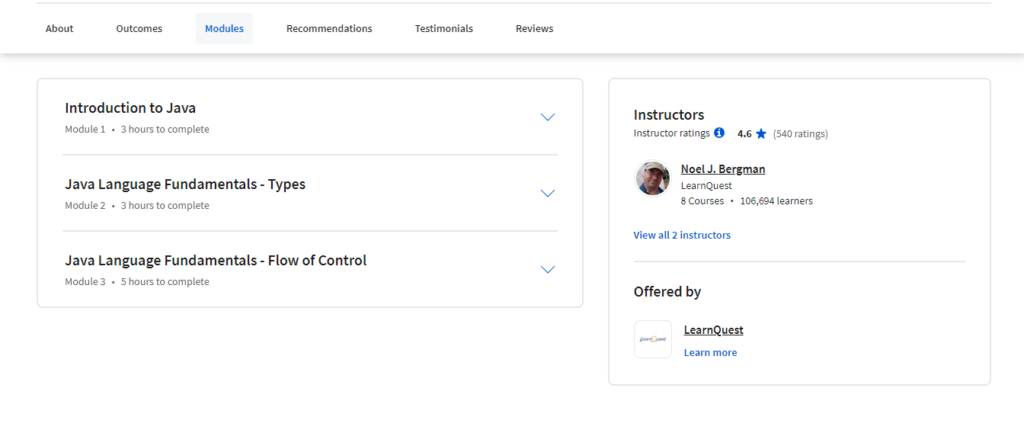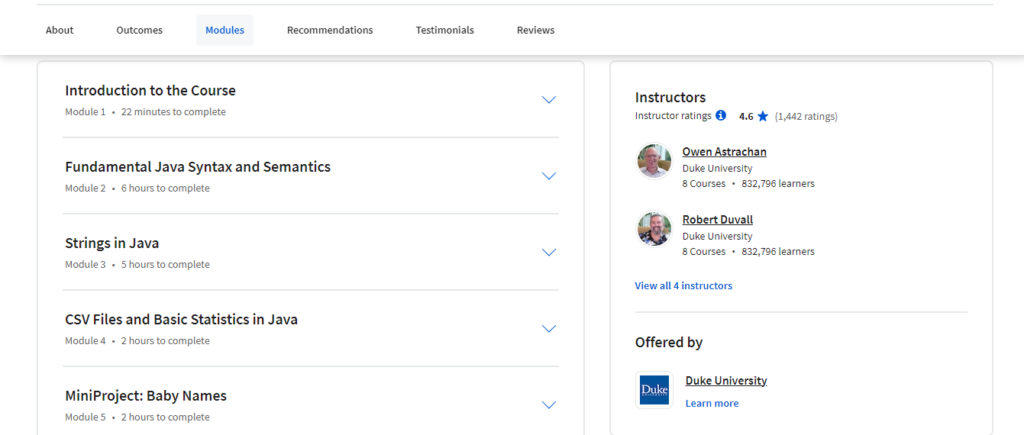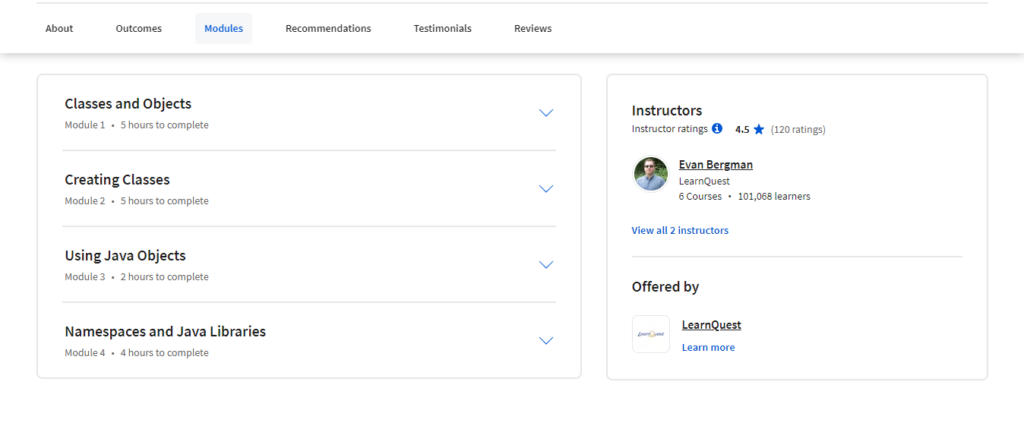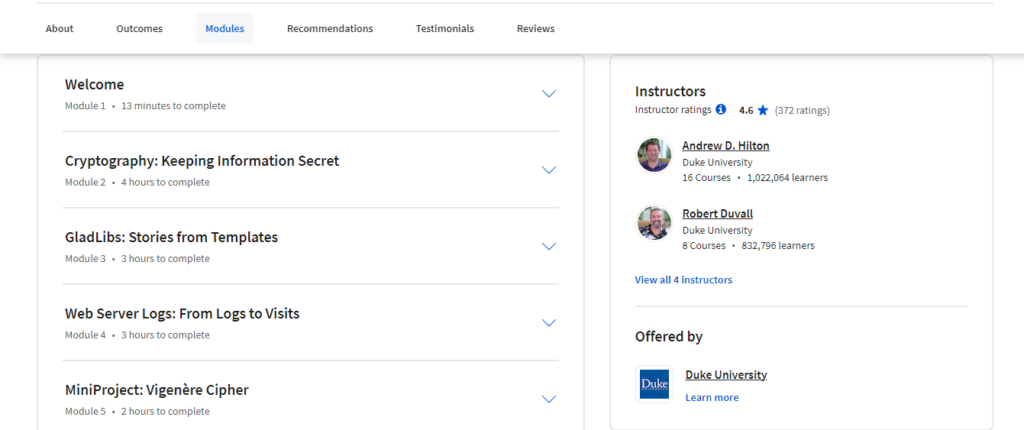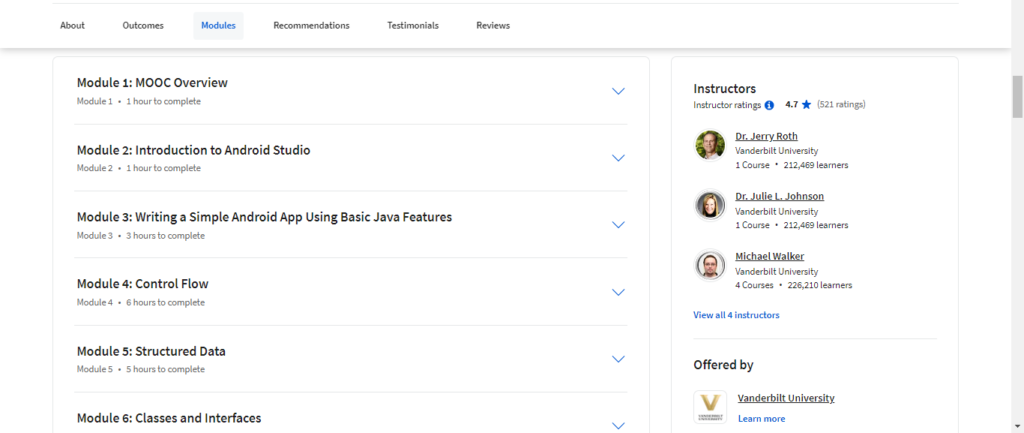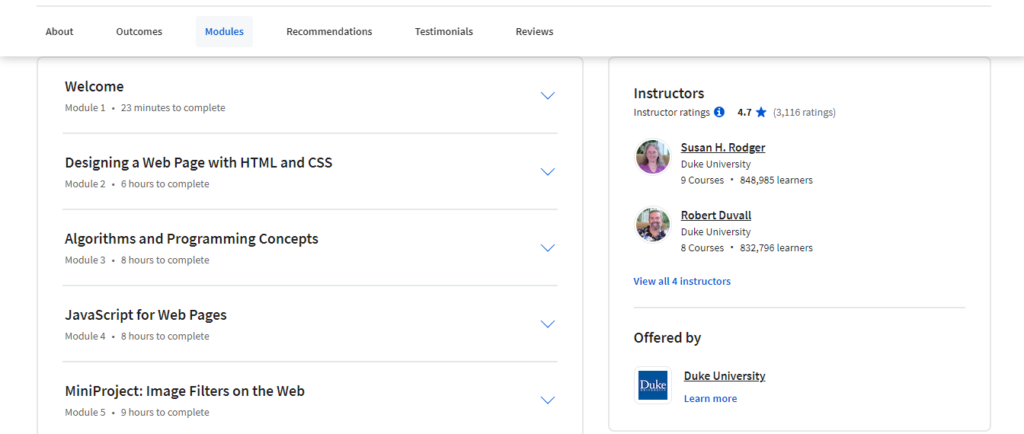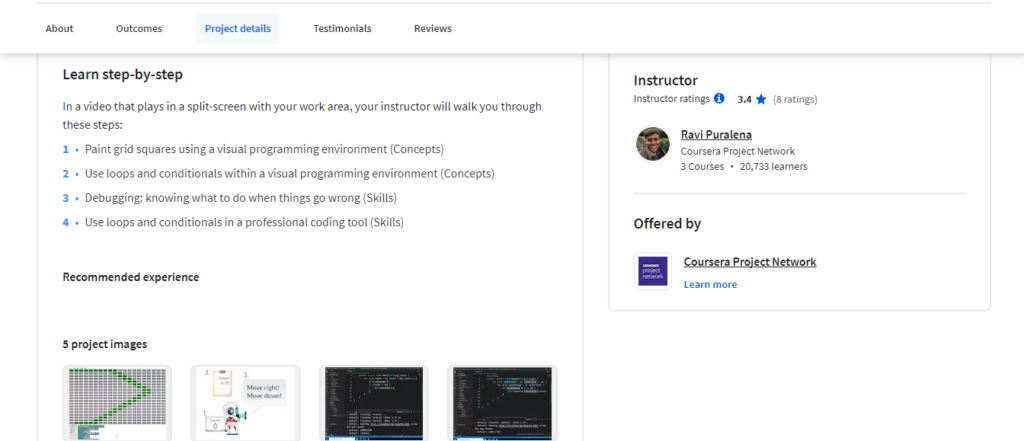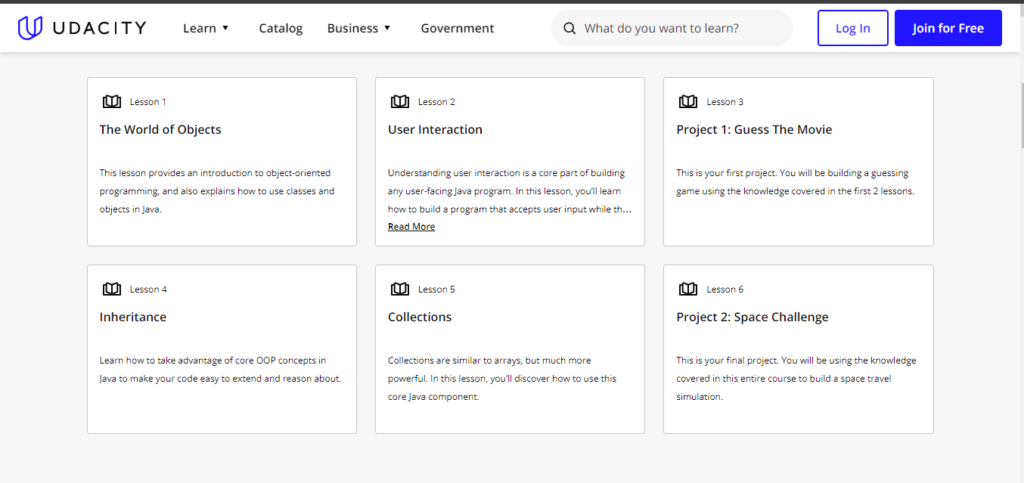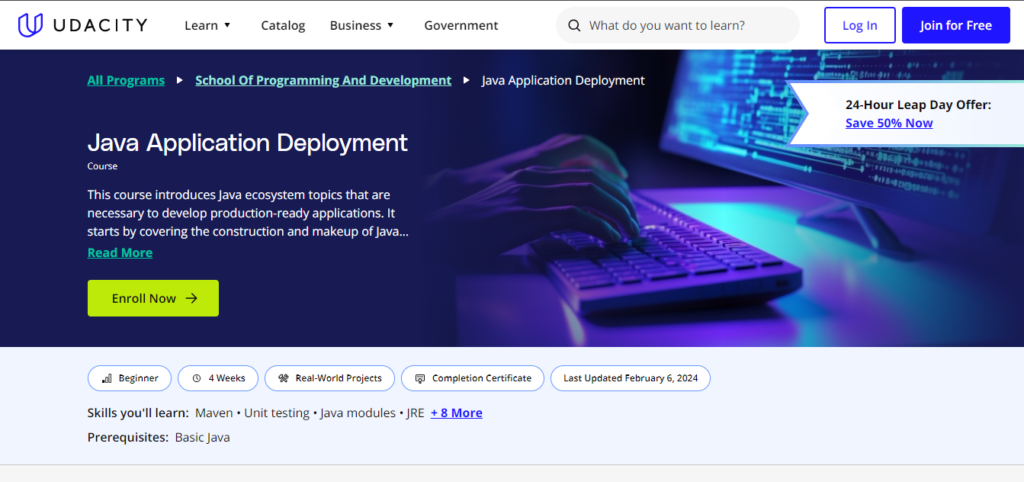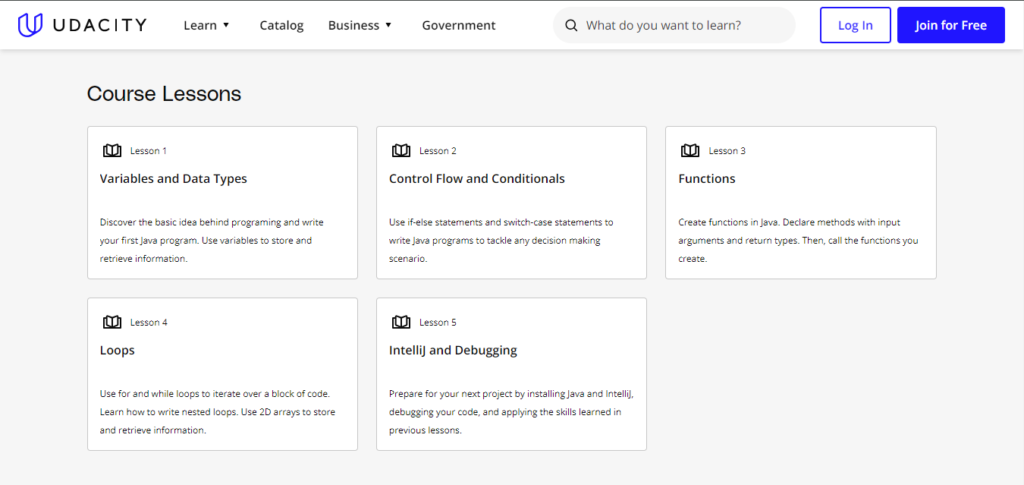Last updated on March 5th, 2024 at 11:04 pm
Students search for the best Java courses available online, as becoming a Java developer is currently one of the hottest career possibilities. These best Java courses are a great option if you’re eager to advance in your job or learn a new programming language.
Data indicates that the average yearly salary for Java developers is $100,000, making it one of the greatest career options for those who are interested. This is why it could be more fruitful to choose a suitable Java course for your study.
We’ve compiled a selection of the top introductory Java classes online in this article. Examine our selection of courses and select one to become an expert in Java programming.
What Is Java?
Java is a popular object-oriented programming language and platform that powers billions of devices, including game consoles, mobile phones, laptops, medical equipment, and many more. It has a lengthy history and various distinguishing characteristics.
Java was developed in 1995 and is presently in Oracle’s ownership. Java is now one of the most widely used programming languages worldwide, powering more than 3 billion devices.
Java is employed for various purposes, such as:
- Mobile applications, especially Android apps.
- Desktop applications.
- Web applications.
- Web servers and application servers.
- Games.
- Database connections.
- And much more!
Benefits of Java
- Cross-Platform Compatibility: Java is compatible with Windows, Mac, Linux, and Raspberry Pi. It is also compatible with other systems.
- Elevated Demand: In the present employment landscape, this programming language is highly coveted.
- Learning Ease: Java is a rather straightforward language to pick up and utilize.
- Free and Open-Source: It is both open-source and freely accessible.
- Security and Performance: Java is a strong, quick, and secure language.
- Huge Community Support: The Java community is made up of tens of millions of developers.
- Java is object-oriented, which lowers development costs by giving programs a clear structure and enabling code reuse.
- Write Once, Run Anywhere (WORA): One of the special qualities of Java is that written Java code can run without recompilation on any platform that supports Java.
Learn New Skills with Coursera Plus
- Coursera Plus offers education from more than 275 top colleges and businesses.
- Included in your subscription is unlimited access to over 7,000 top-notch courses, practical projects, and career-ready degree programs.
- Access videos for more than 90% of courses, professional certificates, and specializations offered by eminent faculty members from prestigious colleges and businesses.
- Take prerequisites, investigate any topic of interest or current interest, and develop your talents.
- A 7-day free trial is included with the monthly subscription, and a 14-day money-back guarantee is offered with the annual subscription. With Coursera Plus, you can access 90% of their online courses indefinitely as part of a membership plan.
- If you want to take more than one course this year, then spend less money on your education.
- You can move between courses, learn at your own pace, or choose a new course.
- Receive a certificate of completion for each course you finish at no extra charge.
- All of this for only $59 a month or $399 a year.
List of The Best Java Courses For Beginners
1. Java Programming And Software Engineering Fundamentals Specialization – Offered By Duke University
The specialization in Java programming and software engineering foundations is ideal for those just starting out in the field who wish to work in software development. Prior programming experience is not required to enroll in this course.
You will study Java programming ideas and how to construct complicated problem-solving programs in this basic course. Additionally, you will learn the necessary foundational skills for a software engineer, like creating algorithms and testing and debugging your product.
You can develop a recommender engine, an interactive web page where you can apply filters to photographs, an interactive portfolio to display your programming talents, and more at the end of the course.
Course Highlights
Institution – Duke University
Platform – Coursera
Level – Beginner Level
Instructor – Andrew D. Hilton, Robert Duvall, Susan H. Rodger, Owen Astrachan
Duration – 6 Months
Rating – 4.6
Language Options – 20 Languages Available
Schedule Type – Flexible Scheduling
What You Will Learn
This specialist course integrates four Java programming courses that cover various programming principles. The first course covers the fundamentals of HTML, CSS, and JavaScript programming. You’ll discover how to use these programming languages to create web pages.
Your capacity for critical thought and problem-solving will improve as a result of this training. You will be able to write programs in JavaScript, use HTML to create web pages, and use CSS to style them.
Then, you will learn how to use Java programming to solve problems. You will gain knowledge of structured data, lists, arrays, and Java programming for software creation. Lastly, you will discover how to use Java to construct a recommendation system.
The five courses included in this specialized program are –
- Programming Foundations With Javascript, Html, And Css
- Java Programming: Solving Problems With Software
- Java Programming: Arrays, Lists, And Structured Data
- Java Programming: Principles Of Software Design
- Java Programming: Build A Recommendation System
2. Introduction To Java – Offered By Learn Quest
This introductory course is ideal for anyone who wants to learn Java or is interested in computer programming and the foundations of software development. It is recommended that students have programming experience in any language in order to comprehend the concepts covered in this course.
This is an extension of Learn Quest’s core Java specialized course that teaches more about Java programming. Essentially, this course provides a foundational understanding of the Java language. By the time this course ends, you will be aware of the advantages of using Java and have a rudimentary understanding of its grammar, data types, branches, and loops.
Course Highlights
Institution – Learn Quest
Platform – Coursera
Level – Beginner Level
Instructor – Noel J. Bergman, Evan Bergman
Duration – 11 Hours Approx
Rating – 4.6
Language Options – 20 Languages Available
Schedule Type – Flexible Scheduling
What You Will Learn
The first module provides an overview of Java, outlining its features and fundamental building blocks. Additionally, you will discover how to set up Java and write a sample Hello World program in it.
Then the foundational concepts of Java, including classes, data types, and syntax, are explained in this course. Additionally, you will interface with the IDE and its various components.
Finally, you will learn how to build basic expressions utilizing loops, branching, and operators in this course.
3. Java Programming: Solving Problems With Software – Offered By Duke University
This course will teach you how to write Java code and use it to solve issues. It is suitable for beginners. This course will teach you how to write algorithms and debug applications.
You’ll write programs that manipulate and access different types of data, like websites and images. Lastly, you need to develop a program that determines popular baby names in the United States based on several factors.
Course Highlights
Institution – Duke University
Platform – Coursera
Level – Beginner Level
Instructor – Andrew D. Hilton, Robert Duvall, Susan H. Rodger, Owen Astrachan
Duration – 17 Hours Approx
Rating – 4.6
Language Options – 20 Languages Available
Schedule Type – Flexible Scheduling
What You Will Learn
An introduction to utilizing Java programming to solve problems is given at the beginning of this course. You will get to know the faculty and receive a rundown of the course. After that, the fundamentals of Java syntax and semantics will be covered.
A thorough description of strings in Java, which are collections of characters like letters, numbers, punctuation, etc., is provided in the third chapter of this course. You will know how to utilize conditional statements, design algorithms, and use For loops after finishing this chapter.
You will learn how to handle data from numerous CSV files using the Apache Commons CSV library in the following section of this course. In this section, you will learn how to work with CSV data to execute various activities.
Finally, you will develop a program to ascertain the level of popularity of certain baby names in the United States. You will apply every skill you acquired in the course’s prior portion during this process.
4. Introduction To Object Oriented Programming With Java – Offered By Learn Quest
Learn Quest’s core Java specialization course continues with an introduction to object-oriented programming using Java. The basics of object-oriented programming and encapsulation principles are explained in this course.
You will be able to develop sophisticated math functions, manipulate strings, and create Java classes in this course. You’ll be able to use Java’s classes and objects notions in your programs and grasp their meaning.
Additionally, this course includes an overview of Java libraries and namespaces to help students better comprehend Java programming.
You should have a foundational understanding of programming or have finished the first section of the core Java specialized course in order to comprehend the concepts covered in this course.
Course Highlights
Institution – Learn Quest
Platform – Coursera
Level – Beginner Level
Instructor – Evan Bergman, Noel J. Bergman
Duration – 17 Hours Approx
Rating – 4.7
Language Options – 20 Languages Available
Schedule Type – Flexible Scheduling
What You Will Learn
Java classes, objects, properties, and methods in object-oriented programming are covered in the first module of this programming course in Java. How to construct Java classes and arrange them in packages is covered in the following chapter. You will also comprehend a number of other Java principles in addition to that.
Java objects, libraries, and namespaces will be covered in the upcoming chapters. In this manner, you’ll pick up a few Java programming ideas.
5. Java Programming: Arrays, Lists, And Structured Data – Offered By Duke University
In this Java programming course from Duke University, you will learn about arrays, lists, and data structures. You will gain knowledge on how to employ data structures to construct intricate programs that address intricate issues.
You will also comprehend Java’s object-oriented programming. By the time this course ends, you will have the ability to develop both an encryption software and a program that decrypts an encrypted file.
You will gain knowledge on handling data files, analyzing and manipulating data, creating class combinations, and other topics in this course.
Course Highlights
Institution – Duke University
Platform – Coursera
Level – Beginner Level
Instructor – Andrew D. Hilton, Robert Duvall, Susan H. Rodger, Owen Astrachan
Duration – 14 Hours Approx
Rating – 4.7
Language Options – 20 Languages Available
Schedule Type – Flexible Scheduling
What You Will Learn
The first of the five modules in this Java course provides an overview of writing programs in Java. An overview of the course teachers will be provided in this chapter.
The idea of maintaining data security and privacy, or cryptography, will then be covered throughout the course. More about cryptography and its different facets is explained in this chapter. Additionally, you will learn about strings and arrays in this part. These are the ideal building blocks for making data sequences.
In later sections of the course, we’ll talk about GladLibs and Web Server Logs. In these sections, you’ll learn how to read information from a web server log, count unique visitors to a website, spot brittle codes, analyze input text files, and generate lists to use in templates.
6. Java For Android – Offered By Vanderbilt University
This is a great Java programming course that covers the control flow of a Java program’s execution via an application.
After finishing this course, you will be able to work with structured data, build class packages, and modify how inheritance and polymorphism work within classes.
With the help of these Java technologies, you can make a variety of Android apps and components. You will learn how to use Java programming for Android development and work on a number of projects related to Android development during this course.
This course is offered by Vanderbilt University as part of their concentration in Android app development. To gain a thorough understanding of Android development with Java, enroll in this specialist course.
Course Highlights
Institution – Vanderbilt University
Platform – Coursera
Level – Beginner Level
Instructor – Dr. Jerry Roth, Dr. Julie L. Johnson, Michael Walker, Dr. Douglas C. Schmidt
Duration – 38 Hours Approx
Rating – 4.5
Language Options – 20 Languages Available
Schedule Type – Flexible Scheduling
What You Will Learn
This course’s first module essentially serves as a quick overview of the subjects that will be covered in the course. In order for you to start developing Android apps, this course will teach you key Java features and object-oriented programming ideas.
The second module introduces Android Studio and explains how to set it up in order to create apps using basic Java programming and Android capabilities.
After that, you will be able to use the Java programming language to create a basic Android app. You will use Java data types, variables, classes, and methods in this procedure.
The Java control flow, including for loops, while loops, do/while loops, and conditional statements, is covered in the section that follows. After that, Java will introduce you to a variety of data structures, including arrays.
The upcoming course modules will cover inheritance and polymorphism ideas, as well as Java classes and interfaces. You will develop a basic project for an Android calculator app by the end of this course.
7. Programming Foundations With Javascript, Html, And Css – Offered By Duke University
The course “Programming Foundations with JavaScript, HTML, and CSS” is a component of Duke University’s Java Programming and Software Engineering Fundamentals specialty. It teaches students the fundamentals of programming in order to help them solve problems with computers.
Using HTML, CSS, and JavaScript, you will learn how to design web pages. And lastly, an effort to create a website where users may submit photos and add filters is underway.
In order for students to comprehend a problem statement and use programming to solve it, this course will help them enhance their critical thinking skills.
Course Highlights
Institution – Duke University
Platform – Coursera
Level – Beginner Level
Instructor – Susan H. Rodger, Robert Duvall, Owen Astrachan, Andrew D. Hilton
Duration – 33 Hours Approx
Rating – 4.6
Language Options – 20 Languages Available
Schedule Type – Flexible Scheduling
What You Will Learn
This five-part foundational course on programming covers a different topic per section. This course begins with an introduction to programming in the first chapter. You will learn how to create web pages, write JavaScript programs, and make an interactive website.
You will create web pages using HTML and CSS and gain a basic understanding of them. Then you will become familiar with algorithms and the fundamentals of programming. This course will also cover the use of JavaScript to create interactive web pages.
Building a web page to allow users to apply filters to photos they upload will be the course’s final minor project.
8. Learn Java With No Prior Programming Experience – Offered By Coursera Project Network
Learn Java without Any Prior Programming Experience: This project-based program will teach you the fundamentals of Java programming in an engaging manner.
This course is intended for complete beginners who wish to start from scratch learning the fundamentals of Java. It includes basic programming concepts so that students with no prior programming knowledge can grasp it with ease.
Course Highlights
Institution – Coursera Project Network
Platform – Coursera
Level – Beginner Level
Instructor – Ravi Puralena
Duration – 2 Hours Approx
Rating – 4.6
Language Options – Taught In English
What You Will Learn
You will learn about visual programming environments and how to print grid squares in them in this project-based course.
It also describes how to use conditionals and loops in a visual programming environment. Following your comprehension of these ideas, the course will advance you to the next level, where you will acquire the debugging competence. This will help you make decisions when things don’t work out the way you had hoped.
Then, you will get knowledge about using conditional statements and loops in your programming. In this manner, the two-hour guided project will teach the fundamentals of Java programming.
9. Object Oriented Programming In Java – Available On Udacity Platform
This course will teach you the fundamentals of object-oriented programming in Java and show you how to write programs in the language using classes and objects.
In this course, the various building elements of the Java programming language will be taught to you. No prior programming expertise is required to enroll in this course. In addition, enrollment in this course is free.
Course Highlights
Platform – Udacity
Level – Beginner Level
Instructor – Asser Samak, James Williams
What You Will Learn
Six lessons total—two of which are projects—make up this course. Classes and objects in Java are defined in the first lesson, along with the purpose of object-oriented programming. Using objects and classes in Java is explained in detail by this.
Eventually, you will write a Java program that receives user input, interprets it, and outputs something. You’ll use the knowledge and abilities you gained from the previous courses to design a guessing game in the third lesson.
Parts of object-oriented programming, such as inheritance and collections, will be covered in the fourth and fifth lessons. You’ll apply these abilities to create a space travel simulation project in the sixth lesson.
10. Java Application Deployment – Available On Udacity Platform
An introductory course on Java programming that covers the themes of the Java environment for application development is called Java Application Deployment. This course will first go over the elements of a Java program and how it is put together, which is essentially the basics of Java programming.
After that, you will study how a Java program is compiled and executed. You will discover how to utilize Maven to control the dependencies of outside projects and personalize and automate the application development process.
In the subsequent sections of this course, you will also learn about Java 9 and JUnit 5. Lastly, a portion of the mockito library will be included, which helps to improve the testing capacity of intricate programs.
Even though this is a beginner’s course, students need to have a foundational understanding of Java programming in order to comprehend the course material. Through this course, you will get knowledge and abilities in maven, java modules, unit testing, intellij, JRE, Jdk, wiremock, mockito, Junit, Jlink, and integration testing.
Course Highlights
Platform – Udacity
Level – Beginner Level
Instructor – Alex Pritchard
Duration – 4 Weeks
What You Will Learn
You will learn everything mentioned above throughout the course of the seven classes. The first lesson provides an overview of the course and the topics covered in it.
Afterwards, you will discover how to use Maven to manage dependencies and execute Java programs. The lesson that follows defines Java modules and walks through the process of breaking up Java programs into modules.
Java integration testing, mocking, test doubles, and unit testing are all covered in the fifth and sixth lessons. Building modules, writing unit tests, and packaging your project for shared usage are all required for the test project, which is the last phase.
11. Intro To Java: Functional Programming – Available On Udacity Platform
This is an excellent free course on the fundamentals of Java programming. You will study the fundamentals of Java programming and its grammar in this course.
You will learn how to utilize loops, functions, and conditionals in Java with this course. You’ll be able to use Java to process data and solve issues after you grasp these ideas.
This course is appropriate for anyone interested in learning Java computer programming. It’s not necessary to have programming experience to enroll in this course.
Course Highlights
Platform – Udacity
Level – Beginner Level
Instructor – Cezanne Camacho, Asser Samak
What You Will Learn
You will study Java data types and variables in the first session of this course. You’ll gain a basic understanding of utilizing variables to store and retrieve data as a result.
The Java control flow, which includes if and switch case statements, will then make sense to you. To make specific decisions, you will create programs that make use of these Java features.
Java functions and how to call and return from them are covered in the upcoming session. Furthermore, you’ll discover how to utilize Java’s pre-defined functions and define your own.
Finally, the concepts of debugging in Java, loops, arrays, and Intellij will be covered. This marks the end of the course.
FAQs
Is Java Platform Independent? If so, how?
It is true that Java is a platform-neutral language. Java programs are compiled into bytecode (.class files) via the Javac compiler, in contrast to many other programming languages. This bytecode is not dependent on the particular hardware or software that is executing it.
It cannot, however, be executed without the Java Virtual Machine (JVM) installed on the operating system. Java is genuinely platform agnostic because its bytecode may be written on any system and run on any other, even with the platform-dependent JVM.
What Are the Top Features of Java?
Java boasts several features that contribute to its popularity:
1. Simplicity: The syntax of Java is simple to grasp and comprehend.
2. Platform independence refers to the ability to run a Java application on several hardware and software platforms.
3. Compilation and Interpretation: Java integrates both compilation and interpretation techniques.
4. Robustness: Features like garbage collection and exception handling enhance its robustness.
5. Object-Oriented: Java supports classes, objects, and other OOP concepts.
6. Security: Java’s ability to share applications without revealing the actual program makes it secure.
7. High Performance: It’s faster than traditional interpreted languages.
Dynamic and Distributed: Supports dynamic class loading and distributed computing.
What Is the JVM (Java Virtual Machine)?
The Java Virtual Machine is referred to as JVM. It performs the functions of a Java interpreter, loading, confirming, and running bytecode that is derived from Java source code. Java runs differently on different operating systems, but the JVM software is essential to making Java platform independent.
What Is JIT (Just-In-Time) Compilation?
The JVM employs a method called JIT compilation. In order to speed up execution, it translates Java bytecode into native machine code during runtime. Before the bytecode is run, the JVM dynamically converts some of it into machine code.
What Are the Memory Storages Available with JVM?
The JVM manages memory using different areas:
a. Heap Memory: Used for object allocation and garbage collection.
b. Stack Memory: Stores local variables and method call information.
c. Method Area (PermGen): Holds class-level information and static variables.
d. Native Method Stack: Used for native method execution.
e. PC Registers: Store the address of the current instruction being executed.
f. Runtime Constant Pool: Contains symbolic references to classes, methods, and fields.
What Is a Classloader in Java?
A classloader is responsible for loading classes during runtime. Java has three built-in classloaders:
1. Bootstrap Classloader: Loads core Java classes from the rt.jar file.
2. Extension Classloader: Loads classes from the jre/lib/ext directory.
3. Application Classloader: Loads classes from the application’s classpath.
What Are the Differences Between JVM, JRE, and JDK?
JVM (Java Virtual Machine): Executes Java bytecode. It’s platform-dependent and ensures platform independence.
JRE (Java Runtime Environment): Includes the JVM, libraries, and other necessary components to run Java applications.
JDK (Java Development Kit): Contains the JRE along with development tools (compilers, debuggers, etc.) for creating Java applications.
Last Thoughts on the Best Java Courses for Beginners
Your ability to comprehend every Java subject will improve, and your learning process will be streamlined when you choose the ideal Java course. The 11 best Java courses for beginners listed above will be useful in this situation.
Make sure to examine every course on this list and select one that corresponds with your professional goals. If someone you know is interested in becoming a web developer, you might also think about forwarding this post to them.
Related Articles
Best Python Courses for Beginners
Best JavaScript Courses for Beginners
How to Choose the right Course
Why is Online Education perfect for Lifelong Learning
Java Vs. JavaScript: What is the Difference
Discover more from Technical Studies
Subscribe to get the latest posts sent to your email.

